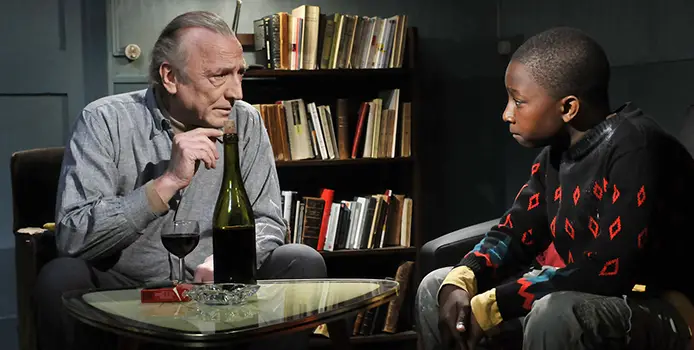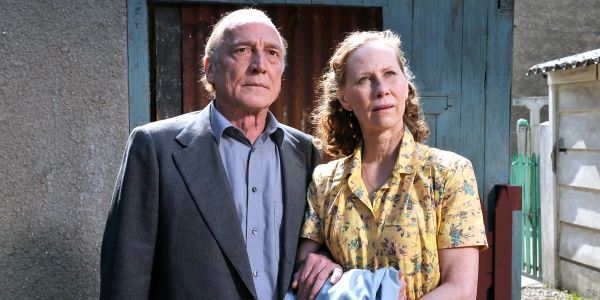LE HAVRE: An Optimistic Immigration Story

Brighton student who loves all forms of film. Happy. Ex-Godard…
Le Havre (2011) is a still, quiet and dryly hilarious film. It has many of the qualities of a Japanese master like Mizoguchi, but if he had emigrated to a small French port and had been forced to make working class comedies. It focuses on a shoe shiner called Marcel Marx whose wife contracts a seemingly terminal disease. He houses and aids an immigrant child named Idrissa whilst his wife is in hospital. It is a film that I recently re-watched, and it struck as a much more stimulating film than I thought, it is theoretical, and beautiful, it is funny, and political.
Love and Politics
Marcel Marx (who first appeared in Kaurismäki’s La Vie de Boheme (1992)) is a character full of implicit love and care, but with a typically morose exterior. He does not, however, wallow in despair as he quit rightly could, instead he grows determined to help, and tracks down Idrissa’s grandfather in an attempt to send the boy to England to find his mother. Marcel’s love is one of the great qualities of this film as it fills the screen, and the viewer, with such joy that it is difficult not to smile throughout. It is a compliment to the brilliant performace by André Wilms to say that we feel Marcel’s love so sincerely through his traditional morose exterior.

Although Le Havre is not a political film in the traditional sense, it is more concerned with Platonic love and kindness, it still has something to say regarding the violent, and inhumane rhetoric surrounding Europe’s ongoing immigration “debate”. We are finally given a representation of immigration as a deeply personal and difficult thing to do. The film humanises immigrants, its penultimate scene shows an act of real human decency. The whole town of Le Havre joins in the sincere, proletarian humanity in helping Idrissa, and, as a reward, Marcel’s wife Arletty miraculously recovers.
This is such a positive and uncynical political move; it is refreshing to see human kindness rewarded so whole-heartedly. Viewed today in the midst of the current, completely constructed and false European immigration “crisis”, it is tempting to focus on the political in Le Havre. However, this would be a mistake as the film itself clearly presents the issue as just one facet of its worth. Thankfully, the specific politics of the issue are left out (cinema is a medium that has tended not to handle complex politics very well, as demonstrated time and again by Godard) and the audience is allowed to enjoy the emotional and cinematic content of the film also.
The Postmodern Proletariat
Kaurismäki’s camera is careful, and still. It does not intrude, it creates a theatrical space for events to happen in and then films those events. But this is not a minimalist approach of realism as we have so regularly seen throughout film history in auteurs like Pasolini, Maysles, De Sica or others, it is a creation of artificial space in which to observe purely artificial events. In Le Havre Kaurismäki’s camera is more like Bresson’s: it is patient, but it observes moments of cinematic form that do not have a place in the realist canon.

It is also not a great leap to see Le Havre’s actors as somewhat like Bresson’s models: they have limited expression, and show muted emotions frequently, they are vessels carrying much of the film’s stillness (admittedly with more human characteristics than say Michel in Pickpocket). The camera’s stillness creates the canvas in which we perceive our characters and their relationships.
Le Havre revels in the opportunity provided by its own sentimentality and artifice. As much as this sounds like a criticism, it is not. The constructed nature of the film is not self-reflexive like Godard, or happily grandiose like Almodóvar; the artificiality is open space for Kaurismäki reap emotion and beauty. The town in Le Havre is a simulation of a reality; the people are caricatures of archetypes of French villagers, the representation of the poor here is almost Victorian, yet the film conjures a precise portrait of an imagination built on notions of ‘Frenchness’. Le Havre embraces the postmodern representation of these places and people, it accepts and preaches this as valid, and it is convincing.
We are given a hyperreal melancholy, which is unique in that it is nostalgic but set in the present, it is nostalgic for a place that, as we know, is mostly a part of Kaurismäki’s diluted notions of idyllic France. The score enhances the hyperreality; we are in a place that has likely never existed outside of this film. This is a true celebration of the process of postmodern representation, and what a wonderful celebration it is.
Le Havre is a superb, fundamental story about kindness, and the rewards kindness brings. It is so full of positivity it may seem naïve to the cynical viewer, but it is not naïve, it is optimistic and it really does makes you feel good.
What are some other films that simply make you feel good?
https://youtu.be/oKzHv6A5Or0
(top image source: Pyramide Distribution)
Does content like this matter to you?
Become a Member and support film journalism. Unlock access to all of Film Inquiry`s great articles. Join a community of like-minded readers who are passionate about cinema - get access to our private members Network, give back to independent filmmakers, and more.
Brighton student who loves all forms of film. Happy. Ex-Godard addict. Watches so many films. About to start degree in Film Studies. Thinks the first 10 series of The Simpsons is the greatest cultural output of any civilisation. Have a nice day.













